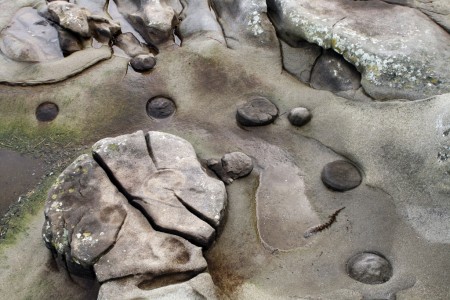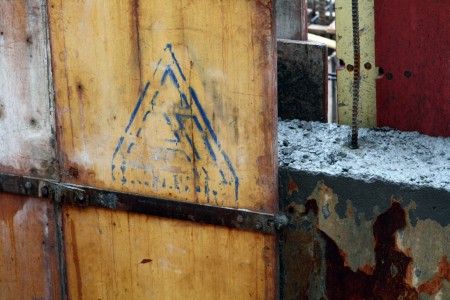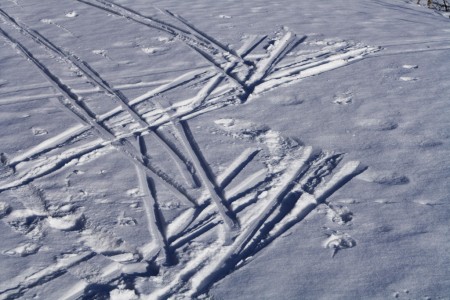
Writer Robert Pool has defined a ‘witness’ as “someone who believes he has information so important that he cannot keep silent.” In the preface to his book, Storms of My Grandchildren, climatologist James Hansen identifies himself using the term. It is truly worrisome to be living in an age when such a prominent climate scientist sees his role in this way – and sees himself as having uncovered information of such importance that he cannot remain an adviser on the political sidelines. Storms of My Grandchildren is the most frightening thing I have ever read, and may end up being one of the most important.
James Hansen explains why we know as much as we do about the climate: not from computerized climate models, but from the evidence of climatic history laid down in ice cores and sediments. The story they tell is one of a dynamic system capable of amplifying small initial changes, and one in which rapid swings have taken place. Hansen identifies the greatest risks from climate change as the destabilization of ice sheets and the loss of biodiversity accompanying the many effects of climate change. On sea level rise, he explains:
If humanity burns most of the fossil fuels, doubling or tripling the preindustrial carbon dioxide level, Earth will surely head toward the ice-free condition, with sea level 75 meters (250 feet) higher than today. It is difficult to say how long it will take for the melting to be complete, but once ice sheet disintegration gets well under way, it will be impossible to stop. (p. 160 hardcover)
Hansen also highlights how positive feedback effects could lead to a runaway climate change scenario, and how the methane locked up in permafrost and methane clathrates has the potential to stack a second gigantic warming on top of the anthropogenic greenhouse gas warming, in the event they ever substantially melt:
[T]he world, humanity, has reached a fork in the road; we are faced with a choice of potential paths for the future. One path has global fossil fuel emissions declining at a pace, dictated by what the science is telling us, that defuses the amplifying feedbacks and stabilizes climate. The other path is more or less business as usual, in which case amplifying feedbacks are expected to come into play and climate change will begin to spin out of our control. (p. 120 hardcover)
In the most extreme case, in which all coal and unconventional oil and gas are burned, the stacked-up positive feedbacks could be sufficient to boil away the oceans, eventually leaving Earth in a state similar to that now inhabited by Venus, a planet formerly adorned with liquid water before a brightening sun induced runaway climate change there.
In addition to the scientific story, Hansen tells some of his own: about the censorship he witnessed at NASA, about his recent civil disobedience actions against mountaintop removal coal mining, about is perceptions of American politics, and about the grandchildren whose prospects have left him so concerned. Sometimes, these asides can seem secondary to the main thrust of the book, though they do underscore the extent to which this is an impassioned personal plea, not a technical scientific assessment. The insight into the scientific process and the operation of the Intergovernmental Panel on Climate Change (IPCC) are also interesting.
The most dubious part of the book may be Hansen’s optimism for fourth-generation fast breeder reactors. He highlights their possible advantages, namely in terms of stretching our uranium fuel supplies, but doesn’t give serious consideration to the practical and economic issues with a massive nuclear deployment. He is also overly pessimistic about renewable forms of energy. I would recommend that he take a look at David Mackay’s excellent book on different routes to a zero-carbon energy future. People who read Hansen’s book may also be well-advised to do so.
Hansen makes some key points about climate policy: notably, that emissions targets and cap-and-trade schemes are meaningless, if governments continue to allow coal use and the exploitation of unconventional oil and gas to continue. Those are the fuels that contain enough carbon to threaten all life on Earth; meaningful climate policy must, among other things, ensure that they remain underground. As an alternative to cap-and-trade schemes that are potentially open to manipulation and which offer no incentive to cut faster than prescribed by the cap, Hansen endorses a fee and dividend system where a tax is applied to all fossil fuels at the point of production or import. His overall view is not so different from the fantasy climate change policy I wrote earlier, though I hadn’t been fully aware of all the risks Hansen enumerates when I wrote it.
In the end, Hansen has provided as clear and compelling a warning as anybody could ask for. We are putting the planet in peril and endangering the lives and prospects of future generations in a deeply immoral way. Governments are misleading people with the sense that they are handling the problem when, in reality, even states taking climate change seriously are doing nowhere near enough to ensure that catastrophic or runaway climate change goes not occur. We need to change the energy basis of our society, and keep the carbon in coal and unconventional fossil fuels in the ground. In so doing, we may be able to stop the warming we are inducing, before it generates the devastating feedbacks that are the key message of Hansen’s book.
Those interested in reading this book should consider taking me up on my offer for a free copy. For those unwilling to commit the time to go through a 275-page book, Hansen has a more concise presentation online in PDF form.
Partly prompted by this book, I am in the middle of starting up a new personal project, intended to help with the planet-wide coal phaseout that is necessary. I will make more information on it public, once it is developed further.
[16 February 2010] Now that I have a fuller understanding of the importance of not burning coal and unconventional fossil fuels, because of their cumulative climatic impact, I have launched a group blog on the topic: BuryCoal.com. Please consider having a look or contributing.





